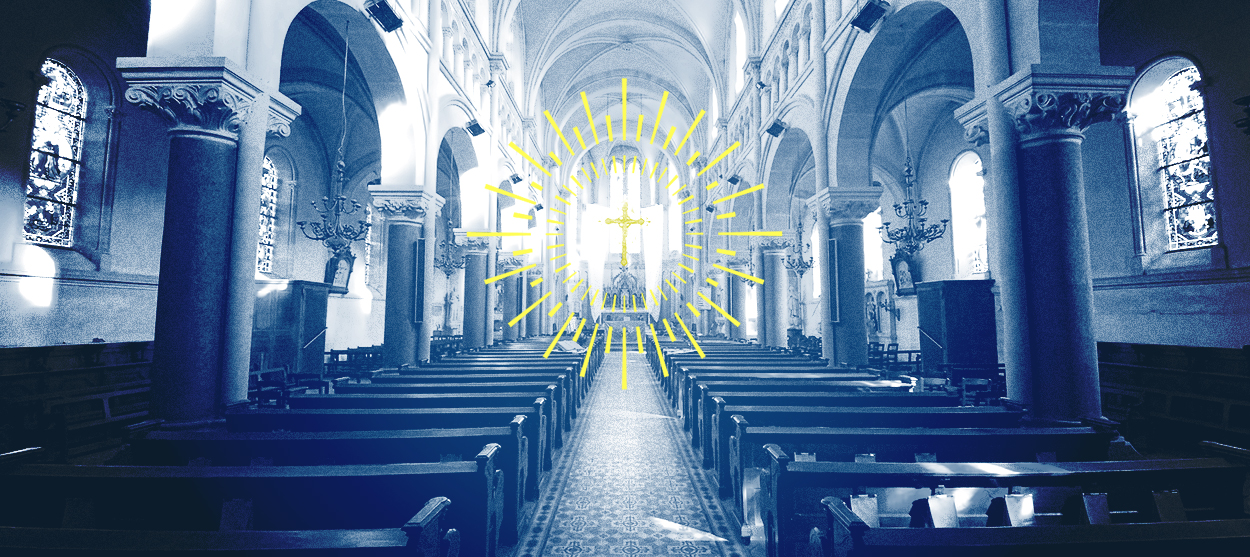Empty churches and the empty tomb


A free daily email with the biggest news stories of the day – and the best features from TheWeek.com
You are now subscribed
Your newsletter sign-up was successful
One year ago on Monday, hundreds of millions of people the world round reacted with horror to images of the cathedral church of Our Lady of Paris burning. She did not collapse, as some feared she would. But it was announced with regret that throughout Holy Week and on Easter Sunday, Notre Dame would be empty for the first time since the days of the Revolution.
Now nearly all of our churches appear empty. I say "appear" because in many of them there will in fact be priests offering the one acceptable sacrifice, in union with the angels and saints. But it is almost certainly the case that fewer people will attend Mass on Sunday than on any Easter in more than a thousand years.
It is difficult to say exactly when the present reality no longer seemed shocking. I cannot be the only person who feels as if the last few months have been mostly indistinguishable. In January and February, a single day did not pass upon which all five members of our family were in good health. Then on my birthday, February 22, our daughter, Winifred Flosshilde, was stillborn. On Ash Wednesday she received Catholic burial at the diocesan cemetery. The following Sunday my wife was still recovering from Winifred's delivery and we did not attend Mass. The next week we entered our parish church and found it somewhat barer than usual; the following Sunday, by which time the obligation to attend Mass had been waived in our diocese, the church looked only somewhat emptier. Our bishop was the last in the United States to suspend public Masses. After that, the church doors remained unlocked. Opening them in order to confess my sins was an experience I shall never forget: a handful of masked women and teenagers hiding in corners like suspicious criminals, all of us praying before the exposed Body of Christ. Beneath the statue of St. Joseph, a handmade system of green and red light bulbs indicated whether the adjacent storage room was empty for the next penitent. It was of a piece with empty streets and empty parks, miserable weather, an atmosphere of relentless dread that many of us will no doubt refer to as "the long Lent." These have been the strangest and most miserable three months of my life.
The Week
Escape your echo chamber. Get the facts behind the news, plus analysis from multiple perspectives.

Sign up for The Week's Free Newsletters
From our morning news briefing to a weekly Good News Newsletter, get the best of The Week delivered directly to your inbox.
From our morning news briefing to a weekly Good News Newsletter, get the best of The Week delivered directly to your inbox.
Why then do I now find myself resisting the urge to be giddy? I am tempted to say it is because I know that sooner or later all of this will come to an end, that out of the darkness we will emerge with our own candles, from the digital cold to the warmth of human affection and communion. But the eventual end of the pandemic and the return of normal human social relations, including the resumed public celebration of Mass, is only a proximate cause. The joy I find building in myself, quietly but undeniably, transcends the gloom of recent days.
It does not, however, transcend bodies. The significance of this fact cannot be overstated. It is the supreme truth of the Christian religion that our faith is grounded not in anagogic speculations but in the reality of flesh and blood, the flesh and blood of a victim who won a victory, total and final, over the forces of sin and darkness, a human sacrifice who was Himself a sacrificing high priest, a non-citizen peasant who was king of all worlds.
Christianity is not a matter of privately affirming certain propositions. The Church is herself a society, both natural and supernatural, a society of human believers whose shared joy is the affirmation of a truth. This truth is, reduced to its barest essence, that a certain body which ought to have been in a tomb was sought and found elsewhere. What this meant was a riddle to which only a few clever women guessed the answer immediately.
We too must stand, like St. Mary Magdalene and her companions, before an emptiness and see beyond it a great light and a body, one both like and radically unlike that for which they had been seeking. This is the Resurrection, the hope of Easter, which must be commemorated with empty churches in spite of, nay because of, the fact that it is founded upon the realization that emptiness means not an absence but the presence of something for which we have longed without knowing it our entire lives.
A free daily email with the biggest news stories of the day – and the best features from TheWeek.com
Matthew Walther is a national correspondent at The Week. His work has also appeared in First Things, The Spectator of London, The Catholic Herald, National Review, and other publications. He is currently writing a biography of the Rev. Montague Summers. He is also a Robert Novak Journalism Fellow.
-
 The Olympic timekeepers keeping the Games on track
The Olympic timekeepers keeping the Games on trackUnder the Radar Swiss watchmaking giant Omega has been at the finish line of every Olympic Games for nearly 100 years
-
 Will increasing tensions with Iran boil over into war?
Will increasing tensions with Iran boil over into war?Today’s Big Question President Donald Trump has recently been threatening the country
-
 Corruption: The spy sheikh and the president
Corruption: The spy sheikh and the presidentFeature Trump is at the center of another scandal
